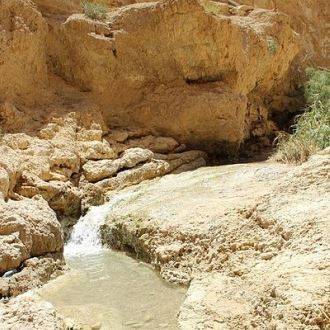A tour of the area of Sodom Square and the southern Dead Sea
Hiking, 4x4
The trip is suitable for families and is accessible with private cars. The entire trip lasts about four hours and includes a drive, beautiful observation points, a short and enjoyable walking path, and a pleasant and unique desert site.
The beginning of the trail is in Arad. You will enter the industrial area south of Arad and drive to the Arad airstrip (a small but hardly used airstrip). You will continue from the runway to the east on marked dirt roads (marked with the Public Sign Post Commission notice), first in green markings and then in blue. It is recommended to visit the beautiful lookout at Mitzpe Zohar, which is to the right of the road (about 200 meters on the road marked in black). The observation point is towards the Edom and Moab Mountains, the Arava, and the southern Judean Desert adjacent to the eastern Negev.
The road continues downwards (blue sign markings) and connects with the road to Arad-Neve Zohar (Route 31) at marker 55, where you will continue to descend eastward, passing Hatarurim junction, facing the Dead Sea. You will drive to the hotels of Ein Bokek, where you will park the car and take a short and beautiful walk to the ""Revolution Spring,"" in the Nahal Bokek Nature Reserve. There is running water all year long, clear pools, typical tropical river flora, and even the animals of the area. The trail is easy and marked with black.
At the entrance to the channel, you will see remnants from the Roman period, and those with a sharp eye will notice the continuation of the trail, on the northern wall of the stream — the mother who brought water from the spring to the altar outside. The duration of the trail (back and forth) is about one to one and a half hours long. As you leave the stream, you will drive south on Route 90, and just after the Dead Sea Works, turn left at the junction to Naot Hakikar and Ein Tamar (there is a sign pointing to the site of Sodom Square).
You will enter the road to Naot Hakikar to the site of ""Fata Morgana."" This is an interesting and beautiful desert hospitality site, which provides agricultural tours, picking of cherry tomatoes, jeep trips, and accommodation. The site offers convenient services, hot and cold drinks, and a variety of delicious meals. You can tour along the embankment of Nahal Arava (on the border with Jordan), among the greenhouses and crops of the experimental farm, and the unique fish ponds of Ein Tamar, all accompanied by professional and interesting guidance of the locals. The end of the trip includes a pond-to-table fish meal, which is highly recommended. Making a reservation is recommended.
Another possibility to extend the trip
A spectacular and beautiful trail on Mt. Sodom, marked with blue trail markings, and nicknamed ""The Fish Trail."" You will cross Mt. Sodom from west to east. Enter the road leading to the famous flour cave, and continue straight north on the road marked in blue (accessible by any vehicle), to the parking lot where there is a sign indicating the beginning of the trail. You must leave a vehicle at the end of the trail near the Dead Sea. The tour takes about two and a half hours. The degree of difficulty is moderate. It is very important to walk only on marked paths since Mt. Sodom is full of dangerously deep open shafts and cracks.
For more information, please call the Tamar Regional Council, Tourism Unit at 08-668 8808.
The story of the site - Tel Arad, and the most ancient Canaanite city in Israel.
The Tel Arad National Park (a paid attraction) is one of the most impressive sites in the Land of Israel, and in the desert in particular, and contains the remains of a well-preserved Canaanite city dating back over 5,000 years ago, and it is the most preserved site in the Middle East. You can tour its temples, palaces, streets, and storage facilities, see the walls, towers and gates, and the impressive water facility at the lowest point in the city. Above the city stands an impressive and large fortress from the early Israelite period (10th century BCE). In the fortress, there is a unique Jewish temple unlike anything else in the world! In fact, this is the only Jewish temple (a remake of the Temple of Solomon that was on the Temple Mount), that survived from that ancient period in its entirety.
Excavations of the site included fascinating finds, including the altar of the temple, ritual objects, and about 200 written scribes (Ostracons), including the names of famous Jewish families, as well as the explicit name of ""Beit Yahweh."" Letters were also found from the commander of the fortress to many officials in the area.
Canaanite Arad stood as the single fortified city in the surrounding desert area, relying on advanced commerce and local desert agriculture.
The Arad of the Israeli period reveals the way of life of the tribes in Israel during the period of the early monarchy (about three thousand years ago), with all their complex character as reflected in the Book of Samuel, and in the Book of Kings.
For those interested, you can see many finds from Tel Arad, in the small museum in the visitors' center in Arad.
Written by: Dr. Shahar Shilo
Photographer: Itamar Grinberg for the Israeli Ministry of Tourism
Similar trails



Spring Water For The Ein Bokek Oasis




Nearby attractions







Nearby restaurants

Hashnizelia- Arad






